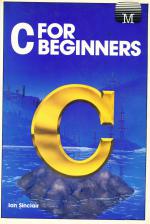
ZX Computing
 1st January 1987
1st January 1987
Categories: Review: Book
Author: David Nowotnik
Publisher: Melbourne House
Machine: Spectrum 48K
Published in ZX Computing #33
C For Beginners
With the popularity of 'C' as the favourite alternative to Basic for programming (see ZXC, August 1986, page 28). It comes as no surprise that there have been several books published recently on 'C'. That prolific author, Ian Sinclair, joins the crowd with his offering, C For Beginners.
Sinclair's concept of a beginner is someone who knows a little BASIC, but now wants to try something else. If that fits you, then this book can be highly recommended.
The opening of the book is fairly standard; what are high and low level languages? - Why do we need so many languages? - compilers and interpreters - and one important difference between BASIC and 'C', structured programming.
After that, you get the fundamentals of 'C' carefully and clearly explained. You have to wait for page 48 of this book of 228 pages to get the first very simple 'C' routine to try out. But, by that stage, the reader should be well in tune with the concepts of 'C'.
From that point onwards, Sinclair carefully builds up the reader's knowledge; by the end anyone should feel reasonably comfortable with the language, ready to proceed to a more advanced book.
Routines in the book were written for the Hisoft 'C' compiler for the Amstrad; these seem to work equally well on Hisoft's Spectrum 'C' compilers. 'C' is meant to be a portable language, so most machine/compiler combinations should accept the fairly simple example routines given in the text.
There are many comparisons made throughout the book to BASIC, so the BASIC programmer should experience no major difficulties. At the back of the book, there is a useful short reference section giving the 'C' equivalent of many BASIC keywords.
Most books on 'C' are a little overpriced, so, by comparison, £10.95 for this excellent little book for beginners represents a good buy.
Scores
Spectrum 48K Version| Overall | 73% |
Scores
Spectrum 48K Version| Overall | 73% |


